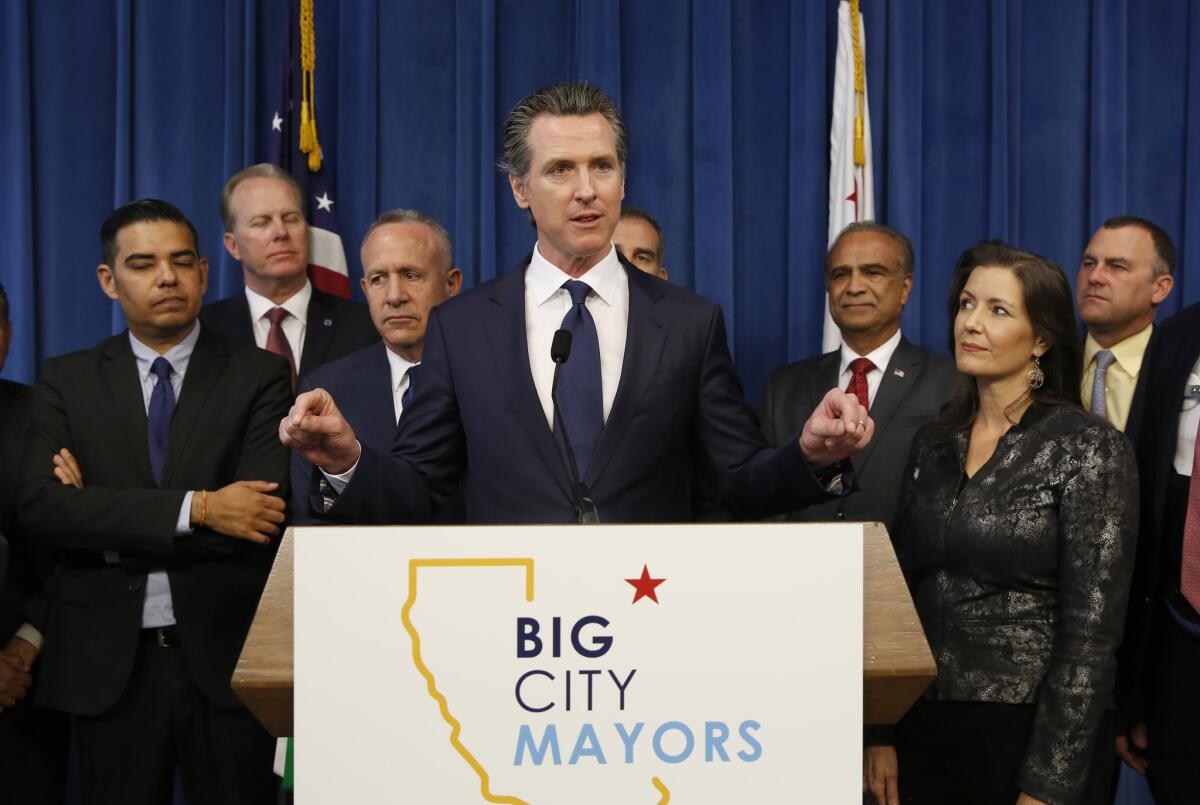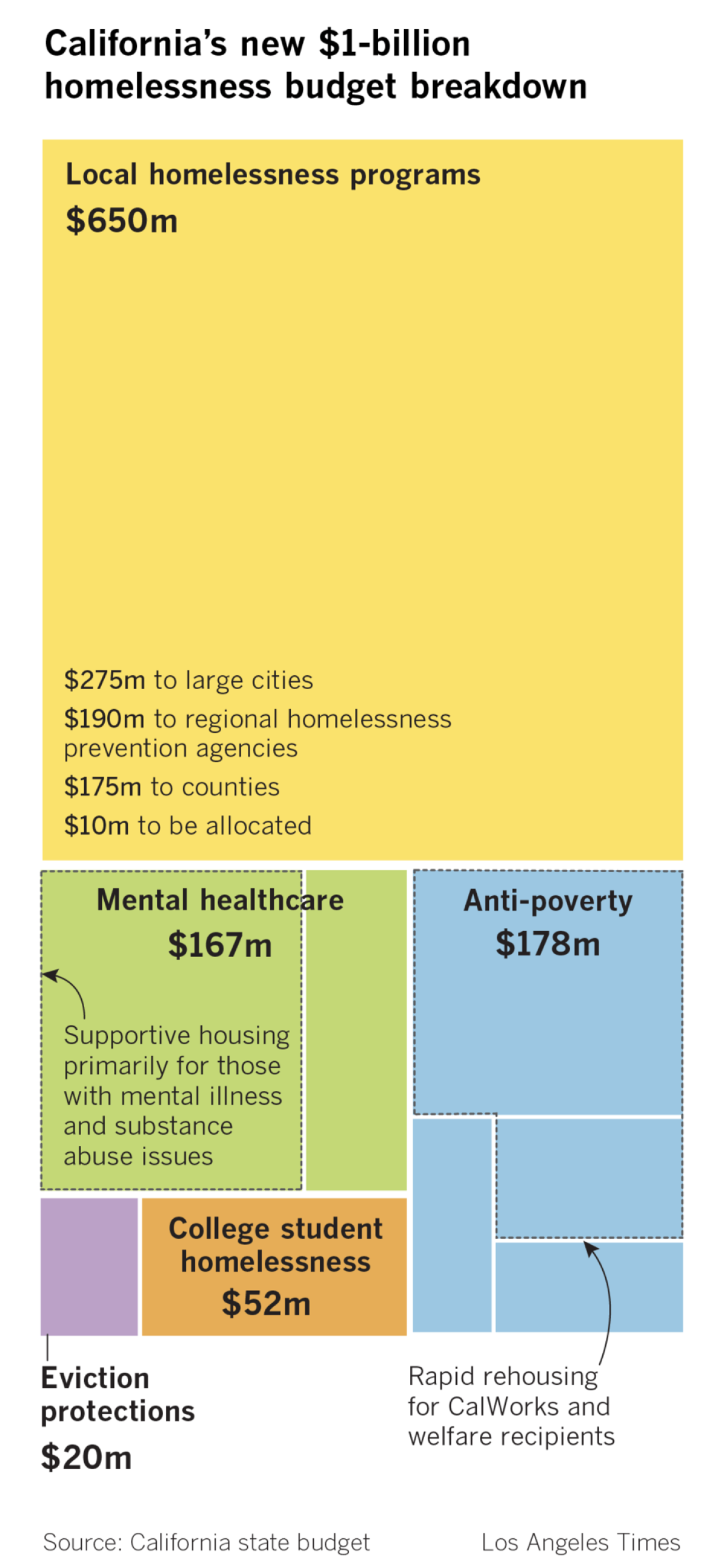California leaders strike deal to give cities and counties hundreds of millions to fight homelessness

- Share via
Reporting from Sacramento — As California contends with dramatic increases in its homeless population, state lawmakers could vote as early as Monday on a plan to send hundreds of millions of dollars to local governments to help address the problem alongside a series of proposals to cajole cities and counties to allow more housing development.
The deal, which Gov. Gavin Newsom and legislative leaders agreed to Thursday, gives Los Angeles and a dozen of California’s other largest cities $275 million in state grants for homelessness prevention measures. Counties would receive an additional $175 million, and $190 million more would go to regional agencies known as “continuums of care,” which coordinate services for homeless residents across the state.
“Cities can’t do it alone,” Newsom said in a budget signing video on Facebook of the spending to address homelessness. “As a former mayor, I was always looking for state support, looking for more federal support. But this state is now stepping up and recognizing that we need to be part of that solution.”
Newsom made lowering the state’s rising housing costs one of his top priorities on the campaign trail, and he has singled out resistance to residential development from cities and counties as one of the key reasons the state doesn’t have enough homes available.
The agreement takes initial steps in dealing with that concern by giving more state housing dollars to local governments that make it easier for developers to build. The proposal also adds harsh penalties, including fines of up to $600,000 a month, in the most extreme cases of cities and counties refusing for years to follow state requirements to accommodate new growth.
“The high cost of housing is chief among the affordability and quality-of-life challenges families face,” Newsom said in a joint statement announcing the agreement with Senate President Pro Tem Toni Atkins (D-San Diego) and Assembly Speaker Anthony Rendon (D-Lakewood).
The most significant part of the announcement in the immediate term is the money to address homelessness.
Los Angeles Mayor Eric Garcetti said in an interview that the city will receive about $130 million, an increase of more than 50% over its funding from a similar state allocation last year. Los Angeles County also will get its own cut, as will the Los Angeles Homeless Services Authority and the cities of Long Beach, Anaheim, Santa Ana and Riverside.
In addition to the money for local governments, the region just received funding from Proposition 2, the $2-billion statewide homeless housing bond that voters approved in November, and will get money from social services and other programs aimed at preventing homelessness.
The legislation also includes a provision allowing some homeless shelters proposed by cities to avoid restrictions under the California Environmental Quality Act, which requires the disclosure of a project’s environmental effects. Neighborhood groups in Venice and San Francisco have recently used the law to try to stop shelters from being built in their communities.
Like other areas of the state, Los Angeles saw a double-digit percentage increase in its homeless population, according to a survey released this month. Countywide, the homeless population increased 12% to just under 59,000 residents.
Garcetti, who lobbied the governor and lawmakers for the increased homelessness funding, said he plans to spend the money addressing public health services, including bathrooms, laundry facilities and showers for those living on the streets, the city’s bridge homeless shelter program and preventing evictions through legal assistance and rental vouchers.
“I intend to spend this money as quickly as possible,” Garcetti said.
Some Los Angeles City Council members are seeking more assistance on top of the spending announced by the state. On Wednesday, Councilman Mitch O’Farrell asked for an additional $1.2 billion from state reserve accounts, matching the amount approved by city voters for homeless housing in 2016.
Garcetti said he backed that request.
“I won’t be shy about singing praises, and I won’t be shy about saying it’s a good start and we need more,” he said. “Gov. Newsom and the Legislature finally recognized this crisis that is ripping the state apart.”
Thursday’s agreement follows a months-long fight between Newsom and the Legislature over penalizing cities and counties that don’t comply with state laws requiring them to plan for growth. When unveiling his initial budget plan in January, the governor proposed withholding gas tax revenue from cities that don’t support enough new housing to keep pace with population increases. After fierce pushback from lawmakers, including within his own Democratic Party, Newsom agreed to postpone implementation of the plan for four years, into a potential second term.
The deal instead boosts judicial and financial penalties for cities that don’t follow the housing supply law, which requires local governments to plan every eight years for enough new housing to meet projected population growth. If a judge rules that a local government has not followed the law, the city would then have an additional year to come into compliance. After that, however, the city would face an escalating series of penalties, including fines of up to $600,000 a month and, in only the most egregious situations, potential judicial takeover of zoning authority to pass a sufficient plan.
Gov. Gavin Newsom threatens to cut state funding from cities that don’t approve enough housing »

It’s unclear how much the proposed penalties would motivate local governments to act. The housing supply law doesn’t require cities or counties to approve new developments, only to plan for them.
Just 42 of California’s 539 cities and counties are out of compliance with the housing supply law, according to the state Department of Housing and Community Development, including rural areas with small populations. None of those communities are in the Bay Area, where housing costs are the highest in the state. In January, Newsom authorized a lawsuit against Huntington Beach, a case that’s still pending and the only such suit that’s so far been filed. For Huntington Beach to face any of the penalties outlined in the legislation announced Thursday, the Orange County city would have to lose its case and then fail to zone for sufficient housing over the next year.
The legislation also gives cities that loosen their own restrictions on growth a better chance of winning state housing dollars. Local governments that approve policies to increase density around transit, allow second backyard housing units or adopt similar measures would receive priority when the state awards grants to support new housing.
More to Read
Get the L.A. Times Politics newsletter
Deeply reported insights into legislation, politics and policy from Sacramento, Washington and beyond. In your inbox three times per week.
You may occasionally receive promotional content from the Los Angeles Times.












